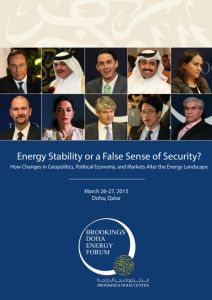Join getAbstract to access the summary!

Join getAbstract to access the summary!
Brookings Doha Energy Forum
Energy Stability or a False Sense of Security?
How Changes in Geopolitics, Political Economy, and Markets Alter the Energy Landscape
Brookings Institution, 2015
What's inside?
Unconventional resources, geopolitical tensions and falling demand prove that the only constant in energy markets is change.
Recommendation
The Brookings Institution convened a group of world-class experts in March 2015 to assess current global energy markets. Their judgments rest on the old truism that the only constant is change. The sweeping development of shale resources adds supply to a market in which overall demand is declining, and geopolitical tensions threaten energy and social stability. Due to the growth of alternative energy sources, stricter ecological controls and shifting power plays, the long-term outlook is as uncertain as it has ever been. Though this authoritative report raises more questions than answers, getAbstract recommends it to anyone interested in global energy’s big picture.
Summary
About the Author
The Brookings Doha Energy Forum convenes annually to assess trends and risks in the energy industry.





















Comment on this summary